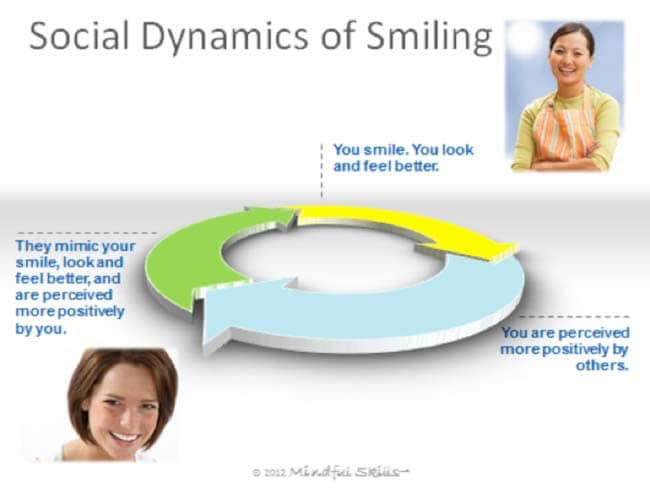Furniture Retail MIndfulness Skill Tip #1: The Science & Practice of Smiling In Retail Sales
Furniture World News Desk on
10/8/2012
 George Chen
George Chen
Thank you for reading my very first column for Furniture World Magazine! I am excited to be a part of this online community, and look forward to our interactions. In these articles, you will find new and surprising ways to think about and apply mindfulness, visualization and related practices to business and personal life.
First, just a few words about me. I am a forty-year practitioner of mind-body and life skills including meditation, martial arts and chi-kung. I’ve been teaching for over twenty years in diverse settings including universities, public and private schools, businesses and prisons. I spent twenty years in the corporate world, and was a director at a Fortune-500 company. These experiences gave me the opportunity to test various mind-body practices in real-world situations, such as working under stressful deadlines or conducting high-stakes negotiations. Everything that I offer here has worked for me and many of my students.
But there’s a catch: these things require practice. If something you read here resonates with you, please give it a try. Spend some quality time doing the exercises and experiments that I describe. Keep an open mind, and take careful note of what happens. And don’t forget to submit your comments and questions to my forum page on the furninfo.com website by
Clicking Here.
So, let’s start with something simple: the power of a smile. First, let’s review the basic science of smiling:
- Your facial muscles are connected to the emotional centers of your brain. Smiles work in two directions—they are both a response to pleasurable stimuli, and can also trigger positive mental states.
- Your brain reads your smile as a command, and responds by initiating a cascade of positive effects. Smiling
- Lowers stress hormones in the blood such as cortisol and adrenaline
- Increases endorphins
- Lowers blood pressure
- Enhances immune function
- Promotes deeper breathing and better oxygenation
The more you smile, the more elevated and energetic you feel. And there is compelling evidence that this energetic lift is more than just a fantasy. Two separate studies, one at UC Berkley and the other at Wayne State University in Michigan, found that high school seniors and baseball players who smiled when posing for class or team photos decades ago subsequently enjoyed better marriages, higher income, more fulfilling careers and greater longevity than their non-smiling peers. In the Wayne State study, those who smiled lived an average of seven years longer than those who didn’t!
All well and good, you say, but what does this have to do with the furniture business?
In the world of business, “service with a smile” is a time-honored cliché. Great business people know instinctively, and studies have proven, that smiling produces a reciprocal response that is naturally conducive to sales and service transactions. It goes something like this:
- You smile. Smiling makes you feel and look better.
- Your customer perceives you as more likeable, approachable and, yes, competent!
- Your customer mimics your smile. This “smile mimic reflex” is an inborn human trait. (Interesting note: it is far more difficult to frown when the person you’re dealing with is smiling.)
- Smiling makes your customer look and feel better.
- You perceive your customer more positively.
Once this reciprocal response is generated—no matter how subtly—the likelihood of a successful transaction spikes upward. In fact, a study at Yale University concluded that a smile is the single most powerful force of influence we possess. That is why master salespeople like Zig Ziglar and Brian Tracy write and speak extensively about the importance of smiling.
Simplified, the response looks like this:

So why, then, is “service with a smile” not enough? There are two basic reasons.
First, there are real smiles and fakes smiles, and humans are hard wired to know the difference. Researchers theorize that one reason for the “smile mimic reflex” is that the mimicker may thereby assess the authenticity of the smile in question. When we detect a fake or forced smile (some well-known politicians may come to mind), it generates distrust rather than comfort. Authentic smiles involve the whole face, including muscles over which we have no voluntary control. Mirthless smiles, involving just the lips, generate more uncertainty and skepticism than good will.
Secondly, customer satisfaction, while based in part on the perception of friendliness, is built on many other factors such as performance, knowledge, honesty, price point and, critically, the sense that the sales person is deeply attentive to the customer’s needs. A study out of Penn State University (Grandey et al, 2009) concluded that authenticity in emotional displays only added to sustained customer satisfaction when the other factors were in place.
To sum up, a genuine smile is one of the most powerful tools you have, not only for creating beneficial service and sales relationships, but for promoting your own personal health and wellbeing. Your smile can open doors, and create moments of positive opportunity with colleagues, clients and customers. And when combined with performance, knowledge, honesty, value and attentiveness, a genuine smile is almost irresistible.
This, of course, begs the question: how can I make my smile “genuine”?
Read my next installment to find out!
About Mindful Skills LLC: George Chen is founder and Program Director of Mindful Skills, LLC, a company that provides transformative mindfulness programs to corporations, schools, institutions and individuals. For businesses, George offers dynamic sales and management training programs that apply the proven power of mindfulness to stress management, communication, team building and creativity. For more information, visit
www.mindfulskills.com. Questions about this article or about interpersonal workplace and stress related issues can be directed to George at
gchen@furninfo.com.
Mindful Sales & Management Skills
Articles in Mindful Sales & Management Skills